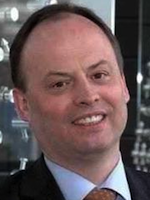Go to
Karlheinz Meier
Local learning capabilities will lead to a breakthrough of brain-inspired computing
Brain-inspired computer architectures have been explored for many decades. They have demonstrated several computational principles but never shown the dramatic superiority over conventional computers that was initially expected.
The recent revival of classical convolutional neural networks has shown that spectacular performance can be reached with network sizes and depths that can now be trained with traditional learning algorithm because of the availability of very high performance computer systems, graphic cards in particular. On close inspection is is clear however, that the training is extremely costly in energy but even more importantly in time.
I will argue, that spiking neurons offer computational advantaged over non-spiking ones and that local learning capabilities on the computing substrate will accelerate learning by substantial factors, leading to systems that can efficiently perform computations according to various principles of neural computing. Deep learning is just one example.
About the panel speaker:
 Karlheinz Meier is a professor of experimental physics at Heidelberg University in Germany. He received his PhD in 1984 from Hamburg University. For more than 30 years he worked in experimental particle physics, contributing to several experiments at the CERN and DESY laboratories. He designed and implemented a large-scale data selection system for an LHC experiment at CERN: Since 2005 he has shifted his interest towards custom hardware implementations of neural circuits. He has initiated and led 2 major European initiatives in the field (FACETS and BrainScaleS) and is currently co-director of the Human Brain Project.
Karlheinz Meier is a professor of experimental physics at Heidelberg University in Germany. He received his PhD in 1984 from Hamburg University. For more than 30 years he worked in experimental particle physics, contributing to several experiments at the CERN and DESY laboratories. He designed and implemented a large-scale data selection system for an LHC experiment at CERN: Since 2005 he has shifted his interest towards custom hardware implementations of neural circuits. He has initiated and led 2 major European initiatives in the field (FACETS and BrainScaleS) and is currently co-director of the Human Brain Project.
Secondary navigation
- EPFL Workshop on Logic Synthesis and Emerging Technologies
- Luca Amaru
- Luca Benini
- Giovanni De Micheli
- Srini Devadas
- Antun Domic
- Rolf Drechsler
- Pierre-Emmanuel Gaillardon
- Jie-Hong Roland Jiang
- Akash Kumar
- Shahar Kvatinsky
- Yusuf Leblebici
- Shin-ichi Minato
- Alan Mishchenko
- Vijaykrishnan Narayanan
- Ian O'Connor
- Andre Inacio Reis
- Martin Roetteler
- Julien Ryckaert
- Mathias Soeken
- Christof Teuscher
- Zhiru Zhang
- Symposium on Emerging Trends in Computing
- Layout synthesis: A golden DA topic
- EPFL Workshop on Logic Synthesis & Verification
- Luca Amaru
- Luca Benini
- Robert Brayton
- Maciej Ciesielski
- Valentina Ciriani
- Jovanka Ciric-Vujkovic
- Jason Cong
- Jordi Cortadella
- Giovanni De Micheli
- Antun Domic
- Rolf Drechsler
- Henri Fraisse
- Paolo Ienne
- Viktor Kuncak
- Enrico Macii
- Igor Markov
- Steven M. Nowick
- Tsutomu Sasao
- Alena Simalatsar
- Leon Stok
- Dirk Stroobandt
- Tiziano Villa
- Symposium on Emerging Trends in Electronics
- Raul Camposano
- Anantha Chandrakasan
- Jo De Boeck
- Gerhard Fettweis
- Steve Furber
- Philippe Magarshack
- Takayasu Sakurai
- Alberto Sangiovanni-Vincentelli
- Ken Shepard
- VENUE
- Panel on Circuits in Emerging Nanotechnologies
- Panel on Emerging Methods of Computing
- Panel on The Role of Universities in the Emerging ICT World
- Panel on Design Challenges Ahead
- Panel on Alternative Use of Silicon
- Nano-Bio Technologies for Lab-on-Chip
- Functionality-Enhanced Devices Workshop
- More Moore: Designing Ultra-Complex System-on-Chips
- Design Technologies for a New Era
- Nanotechnology for Health
- Secure Systems Design
- Surface Treatments and Biochip Sensors
- Security/Privacy of IMDs
- Nanosystem Design and Variability
- Past Events Archive

